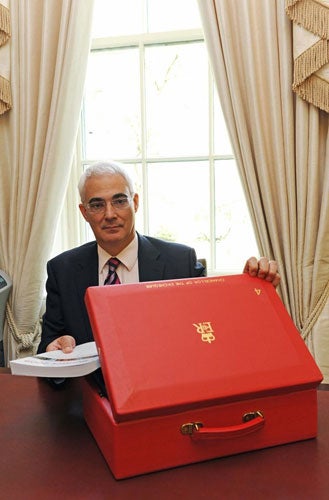So, what would you be doing if you were the Chancellor?
Four leading economists outline their prescription to aid Britain's recovery in today's Budget

Adam Lent, head of economics at the TUC
It's absolutely fundamental that the Government gets the economy back on track as quickly as possible. Clearly we're in the midst of a very serious recession. I don't really believe any of the words you hear about "green shoots of recovery" and it's vital under these conditions that the Government steps in to prevent things becoming any worse than they need to be, particularly with regards to unemployment.
I'd like to see a major fiscal stimulus unveiled in the Budget, which would involve a £25bn public investment programme spread over five areas to get the economy growing again. This would include a short time working subsidy to keep people in work rather than on the dole; an intermediate labour market programme to provide jobs and work experience for young people in particular; a tax credit stimulus which would reduce child poverty and put more money back into the economy; an increase in the jobseekers allowance to £75 per week; and finally a major investment to create green growth and green jobs.
Ruth Lea, head economic adviser to the Arbuthnot Banking Group
If I were Alistair Darling, I would use this crisis in public finances to re-assess what the state should be spending taxpayers' money on. To me, that means taking a scalpel to a lot of public spending programmes. He's already said he'd cut public spending by £5bn from 2007, and now he's saying he'd cut it by another £10bn from 2011, but it needs to be much more critical than that. The whole issue of what and what not to spend taxpayers' money on desperately needs to be addressed. He should be taking out £20bn or £30bn.
I think the rest of the issues people are talking about are just a sideshow. There's a lot of speculation about this being a "green" Budget, but realistically, how much money is the Government going to have to support electric cars? Given the sea of red on our public sector books, it's a total irrelevance. This Budget should be a damage limitation exercise, and there is certainly plenty of damage.
David Page, economist at Investec Securities
The top priority has to be putting in place a credible plan to reduce the budget deficits over the coming years, so I would announce fiscal tightening of fairly large proportions. We need a squeeze in pretty much every area, including a clampdown on spending across the board, down to a level that hasn't been seen since the 1990s. There are very few sacred cows here: one would like to leave education spending broadly unchanged but in reality it might be hard to justify. And I'd announce a rise in income tax, because the scale of the increase in government income that's required means that it's not going to be sufficient to settle for the odd duty tax.
Mr Darling's problem is that this fiscal tightening would come months before a general election, which Labour might lose, but I think that the markets would appreciate the candidness of a Chancellor that looked like he was planning into a new parliament.
Professor Peter Spencer, chairman of the Institute of Economic Affairs' Shadow Monetary Policy Committee
It's a tricky one. Alistair Darling has to do three things: satisfy the financial markets that there are some fiscal rules left; show how he can raise taxes without pushing the economy back into recession; and above all, defer everything until the other side of the general election to help his party.
If I were him I'd put the date at which the current budget must be balanced back to 2020, because it's very significant in green terms [the Government has promised to significantly reduce the UK's carbon emissions by then], and I would reinforce the theme by going for a lot of green taxation now. Selling carbon permits, for example, could be a big money spinner.
I would also put VAT back up to 17.5 per cent and promise to increase it to 20 per cent in 2012. This would get people to spend, rather than save. But he's so far adrift that even these deferrals won't really generate the kind of cash that he needs to close the books.
Join our commenting forum
Join thought-provoking conversations, follow other Independent readers and see their replies
Comments
Bookmark popover
Removed from bookmarks